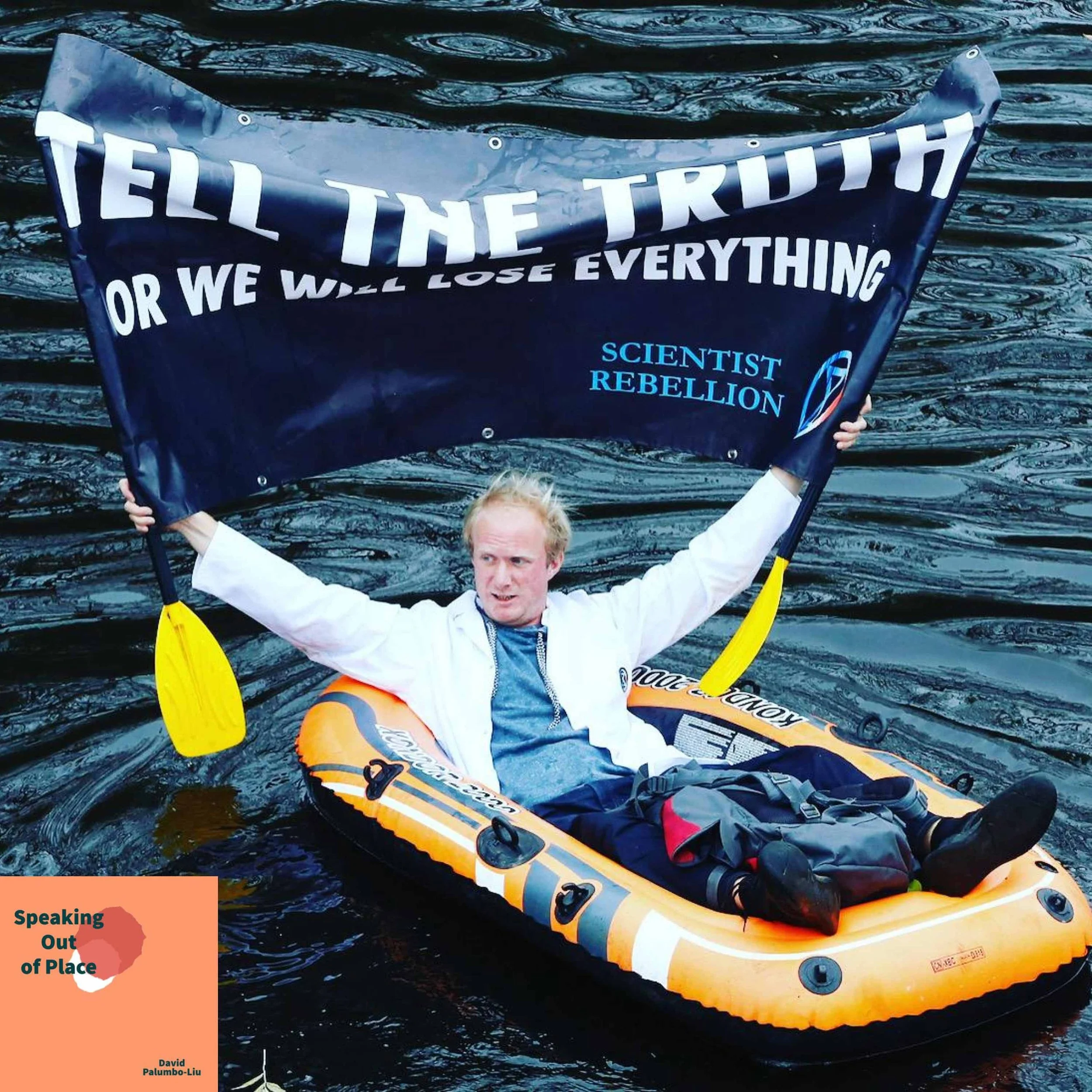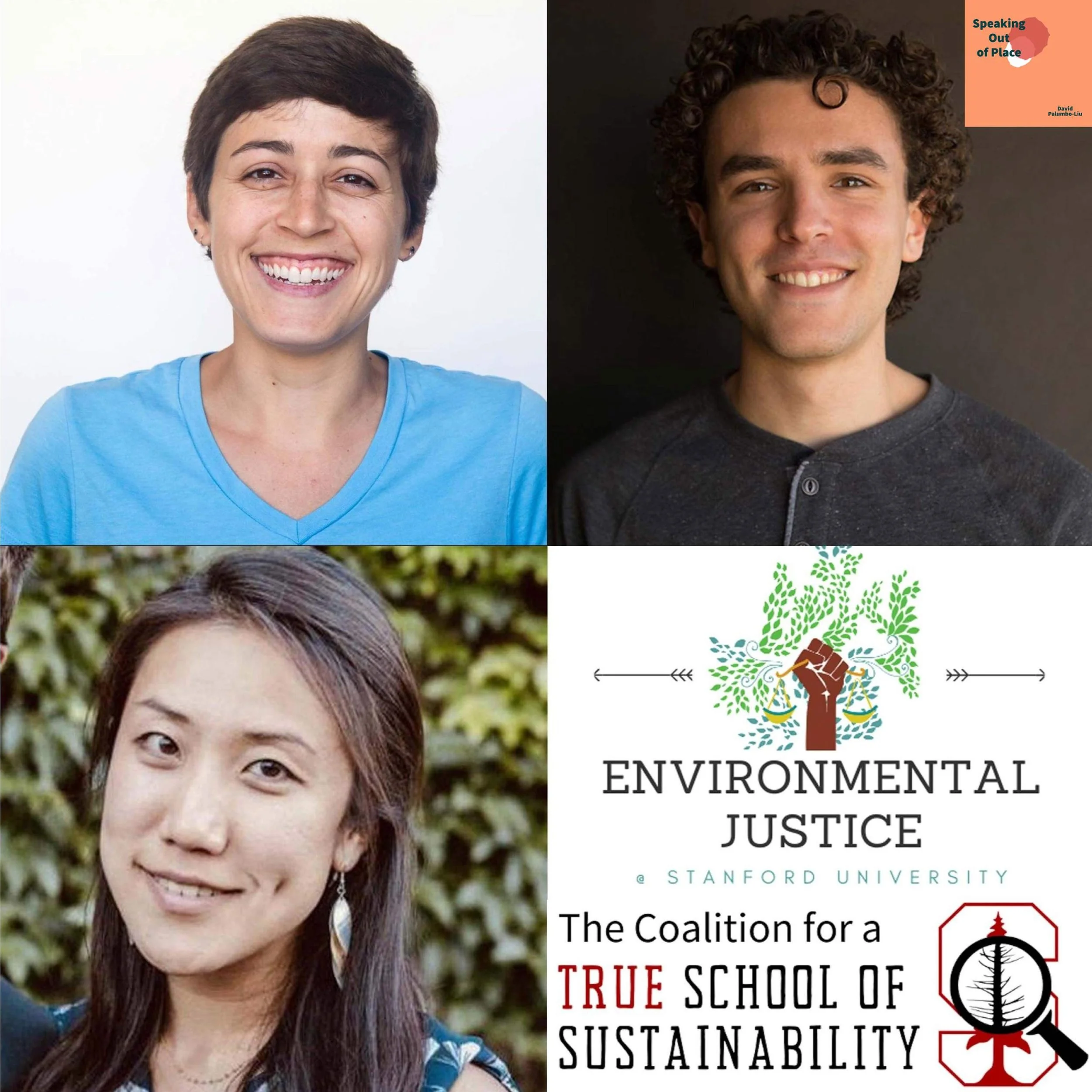In this episode of the Speaking Out of Place podcast, Professor David Palumbo-Liu interviews climate activist, astrophysicist and co-founder of Scientist Rebellion Tim Hewlett.
Scientist Rebellion is a growing climate activist group with 1000+ scientists and academics across 32 countries. Members range from science students and professors to IPCC contributors and leading climate-related scientists. Through disruptive nonviolent action, Scientist Rebellion demands emergency decarbonization via economic degrowth. During acts of civil resistance, members wear lab coats, and volunteers organize the vast majority of the campaign activity.
TIM HEWLETT
I think the more pernicious aspect is the way that science as a set of institutions fits into a paradigm that is doomed from the outset. For instance, if you look at the framing of the science within the IPCC reports and how that informs the construction of policy related to the climate around the globe, well, it's foundationally dishonest.
If you frame an entire report around the need to keep temperatures below 1.5 degrees or 2 degrees, and all of the efforts that societies are going to make to do that, and you omit from the public discussion the fact that we have no chance whatsoever of achieving those goals...there's a really commonly used measure within climate science called the equilibrium climate sensitivity sample, which says basically how much heating do you expect per doubling of greenhouse gas and concentrations in the atmosphere? It's a robust metric, and that suggests that if you double the greenhouse gas concentrations, you should get at least two and a half, probably closer to five degrees of heating.
So we're double impacting the world. We've doubled greenhouse gas concentration. So in what scientific world is it reasonable to construct your arguments around a fantasy like 1.5 degrees? So that's the kind of more pernicious aspect of it that allows corporations, the fossil fuel industry, and the government to keep on polluting, and the idea that the scientific community is saying, yeah, we can still reach these goals.
*
I believe in the UK there have been over a hundred cases in the last year, many of them ending in jail, and that's a massive escalation in recent history. And yet we had one in February that was dating back to the founding action at the Royal Society, but we were being tried for there. And we did win that case. But I think all around the world, what we're seeing is a convergence of institutions of power to try to shut out truthtellers, to try to shut out activists and people who would hold those powerful actors to account.
I suspect it's because they recognize that they are committing heinous crimes, and if there were to be true accountability, they would be the ones being prosecuted.
We've seen top-down directives from the government which are blocking activists and people in court from making legal arguments. In our case, for instance, we weren't allowed to refer to human rights legislation. We weren't allowed to argue the defense of necessity that we're trying to avoid greater harm. There's a long-established principle in case law, but you're not allowed to make those arguments anymore because activists kept on winning. And that's extremely inconvenient to the government. So the government dictated they shouldn't be able to do that. And that's not something that's meant to happen in a separation of powers. So we're seeing this convergence, coalescence of these institutions to try to protect the powerful and to protect the status quo even though that status quo inevitably leads to the breakdown of society.
*
Speaking Out of Place, which carries on the spirit of Palumbo-Liu’s book of the same title, argues against the notion that we are voiceless and powerless, and that we need politicians and pundits and experts to speak for us.
Judith Butler on Speaking Out of Place:
“In this work we see how every critical analysis of homelessness, displacement, internment, violence, and exploitation is countered by emergent and intensifying social movements that move beyond national borders to the ideal of a planetary alliance. As an activist and a scholar, Palumbo-Liu shows us what vigilance means in these times. This book takes us through the wretched landscape of our world to the ideals of social transformation, calling for a place, the planet, where collective passions can bring about a true and radical democracy.”
David Palumbo-Liu is the Louise Hewlett Nixon Professor and Professor of Comparative Literature at Stanford University. He has written widely on issues of literary criticism and theory, culture and society, race, ethnicity and indigeneity, human rights, and environmental justice. His books include The Deliverance of Others: Reading Literature in a Global Age, and Speaking Out of Place: Getting Our Political Voices Back. His writing has appeared in The Washington Post, The Guardian, The Nation, Al Jazeera, Jacobin, Truthout, and other venues.
Bluesky @palumboliu.bsky.social
Apple Podcasts · Spotify · Website















































































